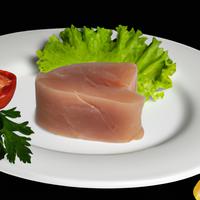
1 serving (85 grams) contains 110 calories, 20.0 grams of protein, 2.5 grams of fat, and 0.0 grams of carbohydrates.

Log this food in SnapCalorie

Nutrition Information
Calories |
305.6 | ||
|---|---|---|---|
% Daily Value* |
|||
| Total Fat | 6.9 g | 8% | |
| Saturated Fat | 1.4 g | 7% | |
| Polyunsaturated Fat | 0 g | ||
| Cholesterol | 97.2 mg | 32% | |
| Sodium | 833.3 mg | 36% | |
| Total Carbohydrates | 0 g | 0% | |
| Dietary Fiber | 0 g | 0% | |
| Sugars | 0 g | ||
| protein | 55.6 g | 111% | |
| Vitamin D | 111.1 mcg | 555% | |
| Calcium | 27.8 mg | 2% | |
| Iron | 1.4 mg | 7% | |
| Potassium | 555.6 mg | 11% | |
* Percent Daily Values are based on a 2,000 calorie diet. Your daily values may be higher or lower depending on your calorie needs.
Food Attributes
Source of Calories
About Solid white tuna
Solid White Tuna, commonly derived from albacore, is prized for its firm texture and mild flavor. Typically canned in water or oil, it is a versatile ingredient frequently used in sandwiches, salads, sushi rolls, and casseroles, reflecting its widespread appeal across various cuisines. Nutritionally, it is an excellent source of lean protein, omega-3 fatty acids, and essential vitamins like B12 and D. These nutrients are beneficial for heart health, brain function, and energy production. However, it is important to note that solid white tuna can contain higher mercury levels compared to other fish options, making moderate consumption advisable, particularly for pregnant individuals and young children. Opting for sustainably sourced tuna helps support environmental health. Overall, solid white tuna is a convenient and nutritious choice, ideal for those seeking balance between flavor, versatility, and dietary benefits.



